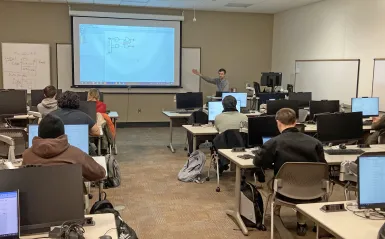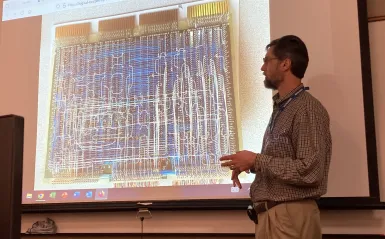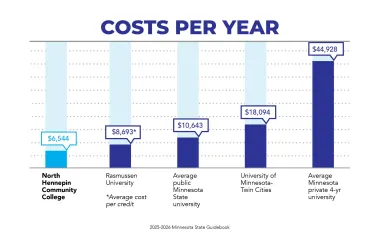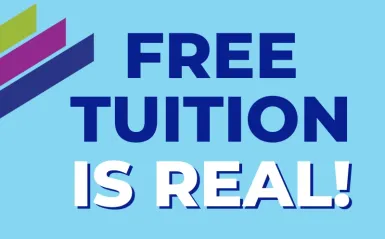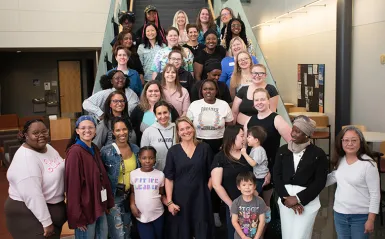Transfer Options
NHCC's Computer Science AS Degree transfers seamlessly to many bachelor's degree programs at Minnesota State universities, and there are many transfer options for private colleges. If you plan on transferring to a bachelor's program, be sure to meet with your academic advisor in your first semester at NHCC.
Minnesota State Transfer
The Computer Science Transfer Pathway AS will transfer to any of the following Minnesota State universities:
- Bemidji State University
- Metropolitan State University
- Minnesota State University Mankato
- Minnesota State University Moorhead
- Southwest Minnesota State University
- St. Cloud State University
- Winona State University
Private College Transfer
The Computer Science Transfer Pathway AS will transfer to Concordia University, St. Paul.
Be sure to meet with your academic advisor if you are considering transferring.
Computer Science Classes at NHCC
Students in the Computer Science Transfer Pathway benefit from small class sizes, and apply what they learn in collaborative, real-world projects, and individual work.
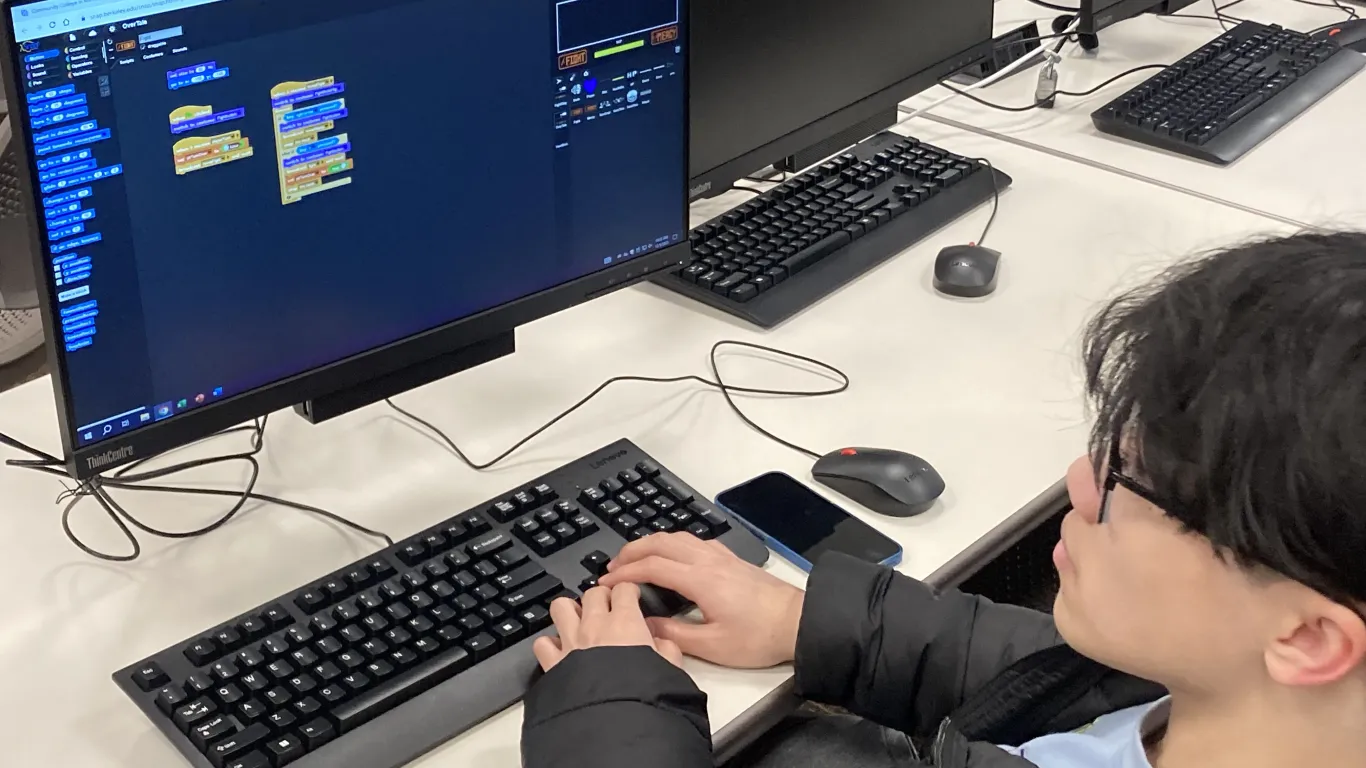
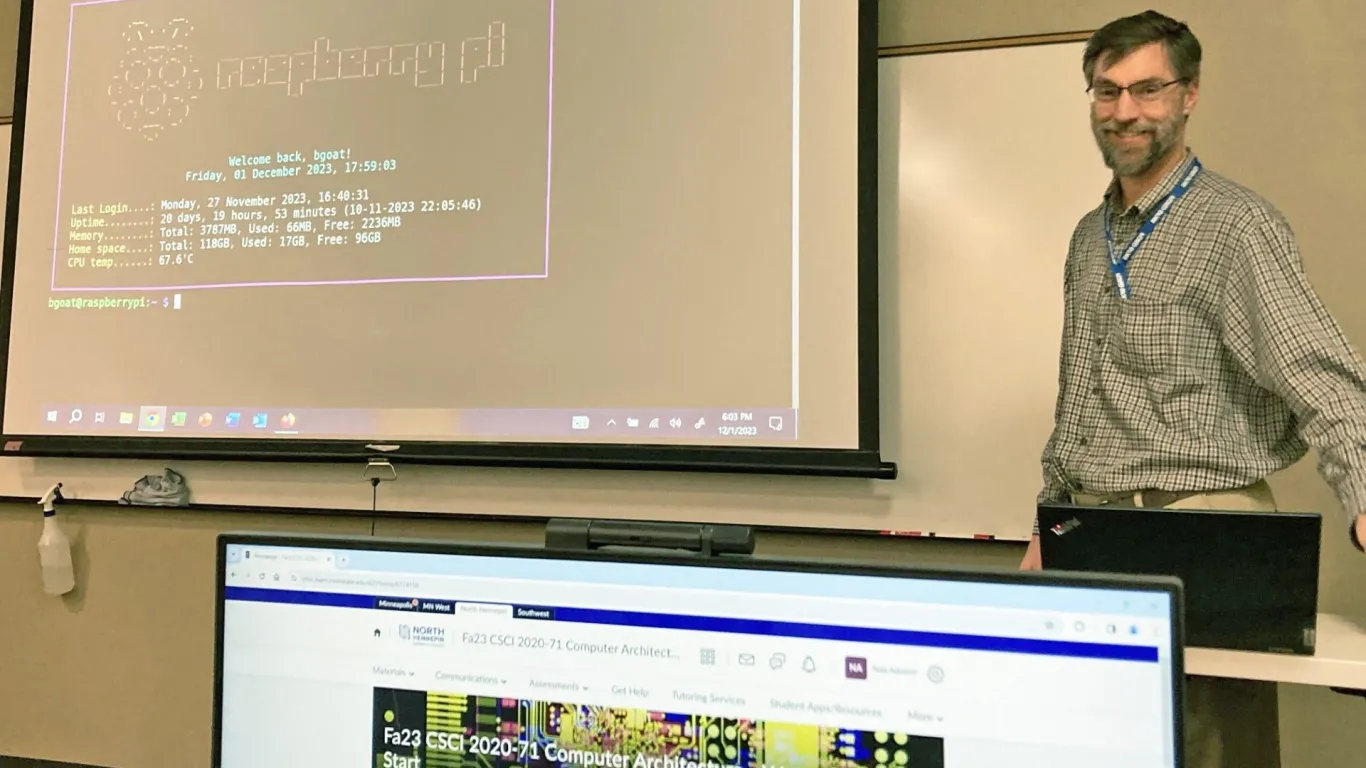

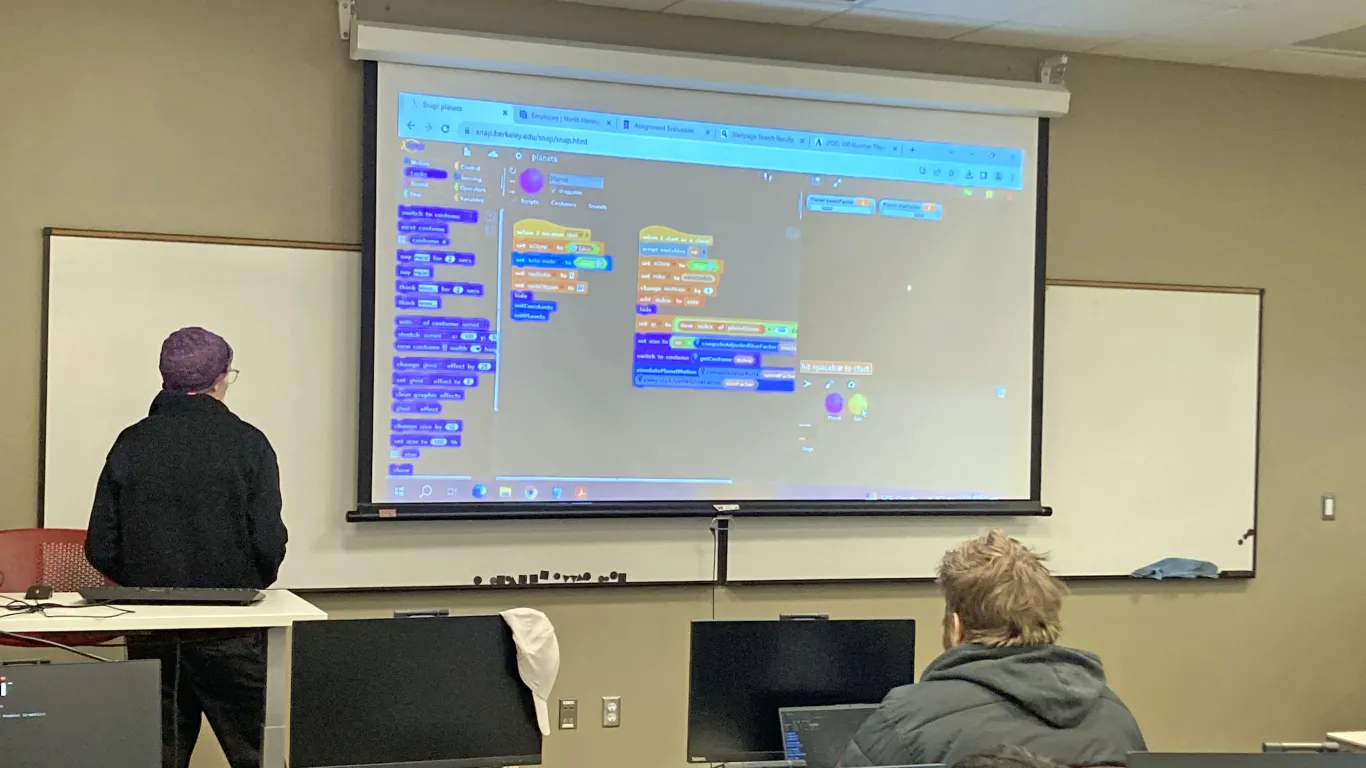
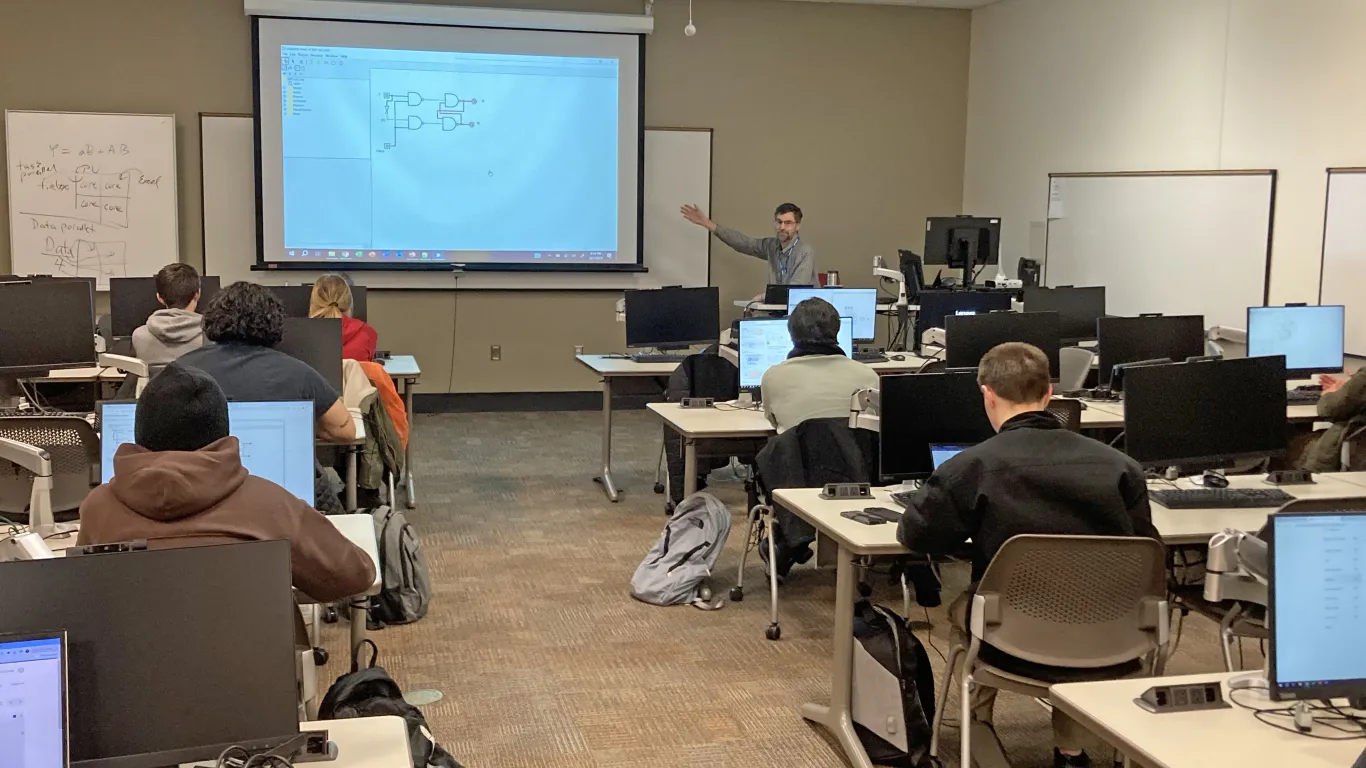
Tips For Computer Science Students From Computer Science Students
Nala Adotevi, a Computer Science student at NHCC, collaborates with peers in a concise blog post, offering essential tips for becoming a successful Computer Science student. Read Post.
What can you do with a Computer Science Degree?
Curious what you can do with a Computer Science Associate’s Degree?
NHCC offers hands-on learning, affordable tuition, and a clear path to tech careers or a four-year university. Read Post.
Meet Diego Gonzalez, a Computer Science Student at NHCC
Diego Gonzalez shares key insights on what it means to be a student in Computer Science at NHCC. Read Post.
Paying For College
NHCC's tuition is among the most affordable in Minnesota.
Financial Aid
- Scholarships are money you don't have to repay
- Grants are money you don't have to repay
Free College Tuition
The North Star Promise scholarship program provides free college tuition to eligible students. Find out if you might be eligible.
Earn a $2,500 Scholarship!
In addition to NHCC scholarships, the college will be awarding $2,500 Workforce Development Scholarships that encourage and reward students pursuing high-demand occupations. Computer Science is a high-demand field and Computer Science students are eligible to apply for a $2,500 Workforce Development Scholarship.
Program Roadmaps
Program roadmaps provide students with a guide to understand the recommended course sequence to complete their degree.
Computer Science Transfer Pathway Curriculum
| Course Code | Title | Course Outlines | Goal Areas | Credits |
|---|---|---|---|---|
| CSCI 1040 | Fundamentals of Structured Query Language (SQL) | View-CSCI 1040 | 3 | |
| CSCI 1130 | Introduction to Programming in Java (CS0) | View-CSCI 1130 | 4 | |
| CSCI 2001 | Object Oriented Programming (CS1) | View-CSCI 2001 | 4 | |
| CSCI 2002 | Data Structures and Algorithms (CS2) | View-CSCI 2002 | 4 | |
| CSCI 2020 | Computer Architecture | View-CSCI 2020 | 4 | |
| CSCI 2030 | Database Modeling and Design | View-CSCI 2030 | 4 |
| Course Code | Title | Course Outlines | Goal Areas | Credits |
|---|---|---|---|---|
| 7 Credits from the Following Courses: | ||||
| CSCI 1020 | Beginning Web Page Programming OR | View-CSCI 1020 | 1 | |
| CSCI 1025 | Responsive Web Design OR | View-CSCI 1025 | 1 | |
| CSCI 1030 | Programming for the Internet OR | View-CSCI 1030 | 3 | |
| CSCI 1035 | Introduction to Computer Programming with Games OR | View-CSCI 1035 | 4 | |
| CSCI 1050 | Computer Security Basics OR | View-CSCI 1050 | 3 | |
| CSCI 1120 | Programming in C/C++ OR | View-CSCI 1120 | 4 | |
| CSCI 1150 | Programming in C# for .NET OR | View-CSCI 1150 | 4 | |
| CSCI 1180 | Introduction to Linux Operating System OR | View-CSCI 1180 | 4 | |
| CSCI 1990 | Computer Science Special Topics OR | View-CSCI 1990 | 1-4 | |
| CSCI 2010 | Discrete Mathematical Structures | View-CSCI 2010 | 02,04 | 4 |
| CSCI 2011 | Programming in Python OR | View-CSCI 2011 | 1 | |
| CSCI 2040 | Introduction to Networking Protocols and Analysis OR | View-CSCI 2040 | 4 | |
| CSCI 2050 | Internship Computer Science OR | View-CSCI 2050 | 3 | |
| CSCI 2060 | Web Programming in ASP.NET OR | View-CSCI 2060 | 4 | |
| CSCI 2101 | Foundations of Cryptography | View-CSCI 2101 | 4 | |
| Course Code | Title | Course Outlines | Goal Areas | Credits |
|---|---|---|---|---|
| College Writing I - 1 course | ||||
| ENGL 1200 | Gateway College Writing OR | View-ENGL 1200 | 01 | 4 |
| ENGL 1201 | College Writing I | View-ENGL 1201 | 01 | 4 |
| ENGL 1202 | College Writing II OR | View-ENGL 1202 | 02,01 | 2 |
| ENGL 1203 | College Writing II with Workshop | View-ENGL 1203 | 02,01 | 2 |
| COMM 1010 COMM 1210 - 1 Course | ||||
| COMM 1010 | Fundamentals of Public Speaking OR | View-COMM 1010 | 01 | 3 |
| COMM 1210 | Small Group Communication | View-COMM 1210 | 7A,01 | 3 |
| CSCI 2010 | Discrete Mathematical Structures | View-CSCI 2010 | 02,04 | 4 |
| MATH 1221 | Calculus I | View-MATH 1221 | 04 | 5 |
| BIOL 1120 GEOG 1010 - 1 course | ||||
| BIOL 1120 | Human Biology OR | View-BIOL 1120 | 03 | 3 |
| GEOG 1010 | Physical Geography | View-GEOG 1010 | 10,03 | 3 |
| ECON 1060, ECON 1070, PYSC 1150 - 1 course | ||||
| ECON 1060 | Principles of Macroeconomics OR | View-ECON 1060 | 08,05 | 3 |
| ECON 1070 | Principles of Microeconomics OR | View-ECON 1070 | 05 | 3 |
| PSYC 1150 | General Psychology | View-PSYC 1150 | 05 | 3 |
| 15 elective credits |
| Total Credits Required | 60 |
2025-2026
The Computer Science Transfer Pathway AS offers students a powerful option: the opportunity to complete an Associate of Science degree with course credits that directly transfer to designated Computer Science bachelors degree programs at Minnesota State Universities.* The curriculum has been specifically designed so that students completing this pathway degree and transferring to one of the seven Minnesota State universities enter the university with junior year status. All courses in the Transfer Pathway associate degree will directly transfer and apply to the designated bachelors degree programs in a related field.
Minnesota State Universities:Bemidji State University, Metropolitan State University, Minnesota State University Moorhead, Southwest Minnesota State University, St. Cloud State University, Winona State University.
Intellectual and Practical Skills, including:
- Employing methodical and technical processes in designing and programming software applications.
- Designing databases to access, manage and store data.
Personal and Social Responsibility and Engagement:
- Following best practices of software development.
- Designing and coding robust programs that conform to industry standards.
Integrative and Applied Learning: Applying computer technology to solve real world problems.
Program roadmaps provide students with a guide to understand the recommended course sequence to complete their degree.
Information on careers, including career descriptions, salary data, and employment outlook is available on the Bureau of Labor Statistics website and O*Net Online website.
If you are planning on transferring to another institution, follow the guidelines available on our transfer resources web page to help you plan the process: Transfer Information
The Associate of Science (A.S.) degree is intended for students whose primary goal is to complete the credentials for a specific career and/or prepare for transfer to complete a bachelor’s degree at a college or university with whom North Hennepin Community College has an articulation agreement. The A.S. degree provides a balance of general education courses and the required scientific, professional or technical courses in the degree program.
A student shall:
- Earn a minimum of 60 semester credits as required in the program, with a grade point average of 2.00 (C) or above in courses taken at North Hennepin Community College. Specific programs may have additional requirements or a higher minimum grade point average.
- Earn a minimum of 15 semester credits at North Hennepin Community College. A student must complete at least 50% of career specific courses at North Hennepin Community College.
- Earn 30 credits in at least 6 Minnesota Transfer Curriculum (MnTC) goal areas.
- Earn 30 professional/technical credits.
- Have four years to complete the graduation requirements as published in the catalog in effect at the time of their initial enrollment. Students taking more than four years to complete their graduation requirements may follow any catalog published during the four year period preceding their graduation.
Completion of an A.S. degree fulfills the Goal Area 2 requirement of the Minnesota Transfer Curriculum (MnTC).
Developmental Courses Some students may need preparatory course(s) in Math and/or English. Courses numbered below 1000 will not apply toward a degree.
Equal Opportunity Employer and Disability Access Information North Hennepin Community College is a member of Minnesota State Colleges and Universities system and an equal opportunity employer and educator. This document is available in alternative formats to individuals with disabilities by calling 7634930555 or through the Minnesota Relay Service at 18006273529.
North Hennepin Community College is accredited by the Higher Learning Commission (hlcommission.org), an institutional accreditation agency recognized by the U.S. Department of Education.
30 N. LaSalle Street, Suite 2400
Chicago, IL 60602-2504
1-800-621-7440
Course Title: Fundamentals of Structured Query Language (SQL) Goal Areas: Credits: 3
Course Description: The goal of this course is to teach students how to design, build and use databases utilizing Structured Query Language (SQL). Students will learn to enter and retrieve information from a relational database. Students will learn SQL syntax for query creation, including complex multi-table joins, and for displaying and analyzing query results. Students will design and deploy their own databases.
Course Title: Introduction to Programming in Java (CS0) Goal Areas: Credits: 4
Course Description: This course provides an introduction to the Java programming language and its foundational topics. In this course students will explore fundamental programming and computing concepts with a focus on problem solving, algorithm development and implementation. Topics included are: data types and memory concepts, arithmetic operators and mathematical expressions, conditional statements, repetition, arrays, methods and the basics of object-orientation.
Course Title: Object Oriented Programming (CS1) Goal Areas: Credits: 4
Course Description: Students will learn object-oriented programming while creating algorithms.The basic principles of software engineering are emphasized. By doing their own Java projects, students will developproblem-solving skills and gain experience in detecting and correcting software errors.Procedures, recursion, and iteration will be presented in the development of algorithms. Inheritance and polymorphism are studied. The use of abstraction will be emphasized throughout the course.
Course Title: Data Structures and Algorithms (CS2) Goal Areas: Credits: 4
Course Description: This course continues using abstract data types and the concepts presented in CSci 2001 and introduces stacks, queues, linked lists, and trees. This course also covers advanced programming topics of recursion, sorting methods, and complexity measures. This is an object-oriented programming course.
Course Title: Computer Architecture Goal Areas: Credits: 4
Course Description: As an introduction to computer organization and structure, this course includes beginning machine and assembly language programming. Topics to be covered include logic gates and Boolean algebra, basic elements of computing devices, basic components of a computer, data representation and number systems, micro operations, microprogramming, and input-output programming.
Course Title: Database Modeling and Design Goal Areas: Credits: 4
Course Description: This course covers relational databases from conceptual design to implementation. The course will include logical and physical design, normalization, as well as the definition of tables and keys. The use of Structured Query Language (SQL) for data retrieval and manipulation will be emphasized.
Course Title: Goal Areas: Credits:
Course Description:
Course Title: Beginning Web Page Programming Goal Areas: Credits: 1
Course Description: Students learn practical techniques and principles of Website authoring; create multimedia-enhanced commercial, entertainment or educational sites; and plan site maintenance, promotion and implementation of user feedback. Prerequisite: Some experience with Microsoft Windows
Course Title: Responsive Web Design Goal Areas: Credits: 1
Course Description: This course will prepare students to design web pages that will respond to the media or device on which they are viewed. This course will focus on HTML5, some JavaScript and CSS media queries. Prerequisites: A grade of C or better in CSci 1020
Course Title: Programming for the Internet Goal Areas: Credits: 3
Course Description: This course covers the practical aspects of a programming language used for development of advanced Internet applications which include: on-line animation and interactivity, feedback, and browser control enhancements. The actual language used (JavaScript, Perl, or Java) will be chosen by the instructor. The course also includes a brief introduction to advanced HTML and SCS, uploading the site to a Web server and promoting it.Prerequisite: CSci 1000 or 1010 or 1020 or CIS 1101 or 1102
Course Title: Introduction to Computer Programming with Games Goal Areas: Credits: 4
Course Description: This is an introductory computer programming course. The students will engage in hands-on implementation of games and simulations in a graphics-enhanced development environment. The students will learn how to transform game scenarios into algorithms and programs, create user interfaces, and incorporate multimedia. Basic computer skills are necessary for success in this class.
Course Title: Computer Security Basics Goal Areas: Credits: 3
Course Description: This course examines the issues surrounding computer security in todays highly technological world. The course is designed to provide an overview of security problems, technical issues and the principles associated with databases, networks, network defense, administrative controls, privacy, operating systems, and programming. The knowledge gained from this course will allow programmers, instructional designers, information technology specialists, and managers to better understand various issues surrounding secure computing. Proficiency in computer skills is strongly recommended.
Course Title: Programming in C/C++ Goal Areas: Credits: 4
Course Description: This course introduces the C/C++ programming language and its foundational topics. In this course students will explore fundamental programming and computing concepts with a focus on problem solving, algorithm development and implementation. Topics included are: data types and memory concepts, arithmetic operators and mathematical expressions, conditional statements, repetition, arrays, functions, procedure and the basics of object-orientation.
Course Title: Programming in C# for .NET Goal Areas: Credits: 4
Course Description: This course provides an introduction to object-oriented programming using the C# programming language. The majority of the course will be on the semantics of the C# language, a major component of Microsoft .NET development environment. Topics include: Visual Studio .NET integrated development environment, selected value and reference types, control structures, operators and expressions, methods, classes, and inheritance. Completion of this class will prepare the student for advanced topics in C#. Prerequisite: Math 1150 with a grade of C or better
Course Title: Introduction to Linux Operating System Goal Areas: Credits: 4
Course Description: This course introduces Linux, a popular open-source operating system and a variety of Unix. Topics include installing and using Linux, the architecture of Linux, using the command-line shell, the file system, common utilities (including text editors), and the basics of shell scripting. As a component of Cyber Security certificate, this course addresses the security matters of user login authentication, file and program permissions, computer networking, and network protocols. Hands-on work with Linux is a central part of this class. Some experience in computer programming is recommended.
Course Title: Computer Science Special Topics Goal Areas: Credits: 1-4
Course Description: Description - This course surveys practical implementations and mechanisms underlying programming languages.Students learn the concepts and terminology of compiler components used to generate computer programs. This is a project based course that entails writing a simple compiler and/or interpreter.Major Content Areas - Topics include interpretation, compilation sequence and targets, language patterns, symbol tables, lexical analysis, semantic analysis and parsing, error handling, code generation, and optimization. Prerequisites - CSCI 1130 or CSCI 1120 or permission of the instructor.Learning Outcomes - Students successfully completing this course will be able to: Describe and explain the terminology and techniques of lexical analysis, sematic analysis and parsing, instruction flow, and code generation. Explain the typical components of a compiler and related models of implementation. Explain low level compilation sequences. Describe cross compilation for operating systems and CPUs. Describe code optimization.
Course Title: Discrete Mathematical Structures Goal Areas: Credits: 4
Course Description: The course covers mathematical topics essential for work in computer science. Topics include: number bases, mathematical induction, sets, relations, functions, congruence, recursion, combinations and permutations, probability, graphs, trees, logic, Boolean algebra, and proof techniques. Computing related problems and examples are integrated throughout the course.
Course Title: Programming in Python Goal Areas: Credits: 1
Course Description: The course will introduce the Python Programming language in terms familiar to students experienced with writing simple, yet complete, programs in other languages. Additionally, the course will focus on utilities and features considered strengths in Python. This includes interfaces to specialized libraries and databases. Prerequisites: CSCI 1120 or CSCI 1130 or CSCI 1150 or CSCI 2001 or CSCI 2400
Course Title: Introduction to Networking Protocols and Analysis Goal Areas: Credits: 4
Course Description: This class examines the basic principles of networking, transitioning from Transmission Control Protocol, User Datagram Protocol, Internet Control Message Protocol, and Internet Protocol (TCP, UDP, ICMP, and IP), network architecture, and the Open Systems Interconnection (OSI) model into network defense. Networks are essential for organizational success, and cybersecurity professionals must understand network processes, protocols, and administration. This course will focus on developing skills in creating network architecture, network administration, network analysis, and how to apply this knowledge to improve the network security posture through defense in depth.
Course Title: Internship Computer Science Goal Areas: Credits: 3
Course Description: The main objective of this course is to provide practical training and real work experience for the students. Often, it will include productive work contribution, and prospective employee evaluation for the employer. It can lead to increased college-industry interaction for the department and the college. Completion of this class will better prepare the student for multiple activities in a workplace. It should reflect positively on the students resume (employers view internship experiences positively.) Internship is an excellent opportunity for a student to affirm career interests. These opportunities can also provide the credentials needed for full-time positions. Internships and co-ops provide opportunities to network with professionals; strengthen confidence, maturity, and professionalism; establish professional references. Prerequisite: Enrollment in the computer science program, completion or concurrent enrollment in CSci 2002, a B average in all CSci courses
Course Title: Web Programming in ASP.NET Goal Areas: Credits: 4
Course Description: ASP.NET is a technology for creating web-based programs and services. This course introduces ASP.NET on the foundation of the prerequisite courses that taught the fundamentals of .NET framework, C# programming language, SQL Server database, and the primary development environment Microsoft Visual Studio.The main goal of this course is to teach the basics of creating and deploying Web applications utilizing ASP.NET technology. Besides using the C# programming language, the students will learn the commonly used ASP.NET controls included in Microsoft Visual Studio. The course includes the techniques of reading the data from a SQL Server database into a Web application and displaying it on a web page, as well as modifying and amending the database content.Prerequisites: CSci 1150 and CSci 1040
Course Title: Foundations of Cryptography Goal Areas: Credits: 4
Course Description: This is a foundational course in cryptography covering systems of secure communication relevant to the field of Cyber Security and to Computer Science in general. Topics include theories and applications of encryption of both historical and modern methods, and techniques for creating systems of secure communication. Programming is undertaken to encode and decode information using industry standard cryptographic algorithms. The C programming language is emphasized due to its ubiquity in both the field of applied cryptography and in operating systems. While this is not a course to study techniques for breaking cryptographic systems (cryptanalysis), considerations are given to the probability that weaknesses in a cryptographic cipher can be exploited and that data confidentiality, integrity, and availability can be potentially lost.
Course Title: Goal Areas: Credits:
Course Description:
Course Title: Gateway College Writing Goal Areas: Credits: 4
Course Description: This class provides extended practice in critical reading, writing, and thinking skills. Students will develop an effective writing process and work to achieve college-level competence in reading and responding to texts, visuals, events, and ideas in a variety of written formats, with an emphasis on the academic essay. Audience awareness, interpretation and analysis, logical reasoning, and persuasive and argumentative skills will be developed. MLA style documentation of primary and secondary sources will be included.
Course Title: College Writing I Goal Areas: Credits: 4
Course Description: This class provides extended practice in critical reading, writing, and thinking skills. Students will develop an effective writing process and work to achieve college-level competence in reading and responding to texts, visuals, events, and ideas in a variety of written formats, with an emphasis on the academic essay. Audience awareness, interpretation and analysis, logical reasoning, and persuasive and argumentative skills will be developed. MLA style documentation of primary sources will be included.
Course Title: College Writing II Goal Areas: Credits: 2
Course Description: This class focuses on the research process, textual analysis of primary and secondary sources, rhetorical strategies for argument and persuasion, and successful integration of sources into a longer academic paper utilizing MLA (or other, as appropriate) documentation format. The class may be disciplinary, interdisciplinary, or topical in content.
Course Title: College Writing II with Workshop Goal Areas: Credits: 2
Course Description: This class focuses on the research process, textual analysis of primary and secondary sources, rhetorical strategies for argument and persuasion, and successful integration of sources into a longer academic paper utilizing MLA (or other, as appropriate) documentation format. The class may be disciplinary, interdisciplinary, or topical in content.
Course Title: Goal Areas: Credits:
Course Description:
Course Title: Fundamentals of Public Speaking Goal Areas: Credits: 3
Course Description: This course provides instruction and practical experience in the basics of public speaking. This course has a performance component: students are expected to create and deliver informative, persuasive and other types of speeches.
Course Title: Small Group Communication Goal Areas: Credits: 3
Course Description: This course examines communication in small groups. Students will participate in and analyze how small groups function, how leadership roles evolve, how decisions are made and how conflicts can be resolved. Students will work in small groups, complete group projects, and analyze group interaction.
Course Title: Discrete Mathematical Structures Goal Areas: Credits: 4
Course Description: The course covers mathematical topics essential for work in computer science. Topics include: number bases, mathematical induction, sets, relations, functions, congruence, recursion, combinations and permutations, probability, graphs, trees, logic, Boolean algebra, and proof techniques. Computing related problems and examples are integrated throughout the course.
Course Title: Calculus I Goal Areas: Credits: 5
Course Description: This course is a thorough treatment of differentiation and an introduction to integration. Topics include the definition of derivative, limits and continuity, differentiation, applications of the derivative, definite and indefinite integrals, the Fundamental Theorem of Calculus, techniques of integration, and applications of integration.Prerequisites: College math placement level or successful completion of Math 1170 or Math 1180 with grade of C or better
Course Title: Goal Areas: Credits:
Course Description:
Course Title: Human Biology Goal Areas: Credits: 3
Course Description: This introductory level course provides students with a one semester overview of the structure and function of the human body. The course is open to all students: however, it does not fulfill the human anatomy and physiology requirement for those who are planning to pursue a career in the health sciences. This course fulfills the lab-like experience requirements for MnTC Goal Area 3.
Course Title: Physical Geography Goal Areas: Credits: 3
Course Description: This course will provide an introduction to the physical processes that are at work at all times on the surface of the earth. This course provides an introduction to the processes that influence the lithosphere, atmosphere, hydrosphere and biosphere. Topics covered include earthquakes, volcanoes, tornadoes, blizzards, winds, precipitation, the Hydrological Cycle, vegetation and soil. This course includes a basic understanding of how these systems interact and how the physical landscape interacts with the human landscape. Included in this will be discussions about environmental concerns such as acid precipitation, ozone depletion, soil degradation, desertification and rainforest destruction. This course includes lab-like coursework/exams that will enhance a student's ability to make observations, form questions, pose hypotheses, make predictions and critically evaluate scientific data and results.
Course Title: Goal Areas: Credits:
Course Description:
Course Title: Principles of Macroeconomics Goal Areas: Credits: 3
Course Description: This course covers mainstream theories, the economy's recent performance, national income and output levels, money and the banking system, inflation and unemployment, fiscal and monetary policies, economic growth, and international trade.
Course Title: Principles of Microeconomics Goal Areas: Credits: 3
Course Description: This course covers theories of consumer and producer behavior as well as market structure, the role of government in the economy, distribution of income, externalities, and taxes.
Course Title: General Psychology Goal Areas: Credits: 3
Course Description: This course provides an overview of psychology, introducing students to the scientific study of behavior and mental processes. Topics covered include theory and research in psychology, biopsychology, consciousness, learning, memory, personality, disorders, and social psychology. Students will demonstrate an understanding of key topics in Psychology and apply course concepts to analyze real-world situations, including their own daily life. Designed for non-majors seeking a foundational understanding of psychology, this course is also suitable for psychology majors fulfilling a three-credit general psychology requirement for transfer purposes.
Course Title: Goal Areas: Credits:
Course Description:
Get Started
If you're ready to get started, apply to NHCC. If you'd like to learn more, you can visit campus or request information.
